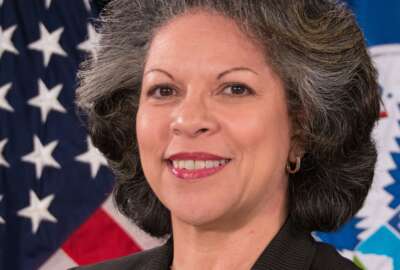Hubbard Radio Washington DC, LLC. All rights reserved. This website is not intended for users located within the European Economic Area.
For Correa, taking risks paid off during her 40-year federal career
Soraya Correa recently retired from public service on July 31 after spending the last six as the chief procurement officer at the Department of Homeland Securit...
Best listening experience is on Chrome, Firefox or Safari. Subscribe to Federal Drive’s daily audio interviews on Apple Podcasts or PodcastOne.
During her 40-year career in government, Soraya Correa was a risk taker.
Whether it was taking on new positions with the Navy or General Services Administration, or an innovative approach to acquisition, Correa knew those risks were worthwhile as long as she did one thing consistently: Create lasting and real relationships with her federal and industry counterparts.
Correa, who recently retired from public service on July 31 after spending the last six years as the chief procurement officer at the Department of Homeland Security, said balancing those relationships against smart risks helped ensure mission success throughout her career.

“One of the things that I believe is it’s important for a leader to understand — and I always cultivated this — is the other person’s perspective. Whether I’m negotiating a contract or just bartering with someone about hiring a person, you have to understand the other person’s perspective. That’s one thing that I think I’ve done well. That doesn’t mean that I will always agree with you. But it does mean that I tried to put myself in your shoes and understand why you see things the way you do, as opposed to just saying, ‘well, what’s wrong with them? They’re wrong,’” Correa said during an “exit” interview with Federal News Network. “I don’t immediately jump to the conclusion that someone is wrong. I jumped to the conclusion that there might be a reason why they’re thinking that way or why they’re hesitating or why they’re not comfortable. So what I’ve tried to do, and I started this very early in my career, is whenever I wanted to do something or try something new, I would sit down and explain why I wanted to do something right. Why I thought it was a good idea and how I looked at it. I would always ask the question, ‘What do you think?’ ‘How does this work to you, too?’ ‘Are you do you have concerns?’ I would take into consideration what they had to say.”
She credited that approach to why she believed her relationships with attorneys, chief information officers, contractors and many others was always strong.
“I never feared talking to industry. When I was a contracting officer, I enjoyed talking to industry, whether it was doing market research or sitting down and talking to them about why they didn’t win a particular opportunity, or sitting post-award in a contract administration meeting sometimes contentious because something wasn’t going right, and figuring out how we were going to solve a problem,” Correa said. “At the end of the day, that’s what the partnership is about. Once we award that contract, it’s a partnership and we got to deliver success. I always focused on those relationships, and how we could work together, how we could collaborate and understand one another and deliver success for the agency.”
Correa said of all the things she accomplished during her career, which started as a GS-4 clerk typist for GSA’s Public Building Service and took her to the Navy, NASA and finally DHS, she was most proud of these connections that led to many successes and some failures.
What was different about Correa during her career was that even a failure such as the FLASH procurement from 2017 could be a successful learning experience, resulting in improving DHS acquisition processes and people.
“We were aggressive and we were trying to do a really big procurement. We didn’t use the downselect processes perfectly. I’m not sure that our team always understood the objectives and the risks that they could take. I’m not sure that I did a really great job of making sure they understood some of the risks that they could’ve taken or here’s some of the things where we could change things. So we took an agile approach to doing the procurement, and then we fell into a waterfall documentation process that just turned into a protest nightmare,” she said. “What we learned was we’ve got to think about that strategy a little bit more closely. We need to bring industry in much earlier. What you’ll find is if you look at a lot of the major procurements that we’ve been working on over the last few years — data center, First Source III and others — that’s what we’ve been doing. We’ve been engaging industry very early and often, sharing with them what we’re thinking about doing, what we’re looking at, what the schedule is, the documents that we’re going to give you, the statement of work and award criteria, etc. So I think we didn’t do enough of that in Flash.”
Top cover, accepting responsibility
She said the lessons from Flash now are part of how the Procurement Innovation Lab (PIL) trains other members of the acquisition community.
The Flash procurement isn’t the only example, but the most well-known one, where Correa gave her staff top cover for a mistake or to try something new that may not work, which is a rarity in government.
“It would have been easy for me to just not say anything and say the contracting officer didn’t do [Flash] right. It was my responsibility and I said, ‘we’re going to do this, and we’re going to try it.’ At the end of the day, I was responsible for guiding and directing the process. It didn’t work out, but I also made sure that people understood, failure can lead to success,” she said. “Failure is not that bad of a word. When you fail, it’s usually because you’re trying to do something better, different and more efficiently so you’re probably going to learn, and that’s what most successful people will tell you. I use the word failure in government because people don’t like that word. It’s scary. The failure gods will come and get you or whatever. I use the word failure because it is a strong word. I want people to understand, we’re going to stub our toe. We’re going to make mistakes, and it’s okay. When you’re trying to do something better, more efficient, more effective as long as you have a plan, a way to get yourself out of it and fix the problem and learn from it, that’s okay. So to me that was the big lesson of Flash is stand with your people support them, made sure that as the leader of the organization, you take responsibility for what happens and make sure your people know that you’re going to take responsibility.”
This same philosophy has become standard in the PIL.
Correa said the guiding principles of the organization is not to change the Federal Acquisition Regulations, but to interpret and find the right flexibilities to reduce the friction or burden of the process.
“What we’ve done is really build innovations around how we use the flexibilities in the FAR. Take the downselect process. The downselect process is part of the FAR. It’s there, it’s been there, you could do voluntary or you could do mandatory downselects, or what people like to call a ‘go, no-go’ factor. What we’ve done is taken it to the next level by doing a multi-phase downselect so that you are continually down selecting and the vendors that are not qualified or not likely to receive award get out of the processes early so they can go off and do other things,” she said. “It costs industry money to bid on contracts. Let’s not make them waste their time because that’s what leads to frustration and protests.”
The PIL also looked at how the agencies communicate with vendors before, during and after an acquisition.
Reverse industry days do matter
This led to another innovation around reverse industry days.
Now some vendors will say these events are mainly for show, but Correa pushed back against those perceptions.
“We do listen and people do hear the feedback about the reverse industry days that we get from our program managers and our program analysts, which is phenomenal,” she said. “If we weren’t listening, we probably wouldn’t have as many industry pre-solicitation engagements as we do today.”
She said some of this perception comes from the fact that certain program offices or bureaus do not feel comfortable changing their processes and taking what they see as a more risky approach. But her office and the folks at the PIL as well as many DHS components apply what they learn from the reverse industry days to future acquisitions.
Correa said she would like to see several changes in the federal acquisition process, including opening the door for every agency to use other transaction agreements and commercial solution openings approaches. She also would like to the Office of Federal Procurement Policy to mandate, or at least strongly encourage, a standard organizational structure for all agency acquisition shops.
“It’s all over the map in the federal government, sometimes they report to the CFO, sometimes they report to an undersecretary for administration or whatever. I really think there should be a little bit more consistency across government in terms of how we look at senior procurement executive or the equivalent of the chief procurement officer, how we staff them, how we organize them and the expectations that we have of them,” she said. “I really want to see something being done with the protest process. I am a firm believer in the protest process. I think companies should have that opportunity to come in and challenge the government, if they really believe the government did something wrong or misinterpreted or misevaluated proposals. That said, when I watch us go into this vicious cycle of just constantly being protested, and people just challenging over and over the same issue, or nitpicking or coming at you with the same question over and over and over again, that is just wasting money. It shouldn’t be that way. There has to be a beginning and an end to the process. You can’t be wrapped up in protests for the next two to three years. That’s inefficient facts on the packet.”
As for her future, Correa didn’t commit to full retirement, but did say she would be taking some time off and then seeing where things lead next. She said, as of now, there is no truth to any rumor that she is in the running to be the administrator in the Office of Federal Procurement Policy.
Copyright © 2024 Federal News Network. All rights reserved. This website is not intended for users located within the European Economic Area.
Jason Miller
Jason Miller is executive editor of Federal News Network and directs news coverage on the people, policy and programs of the federal government.
Follow @jmillerWFED
Related Stories
Exclusive
Acquisition Policy
Read more
DHS’ internal assessment of its $1.5B agile contract: ‘significant errors and missteps’
Related Stories
-
How DHS’ innovation lab is helping other acquisition offices get into shape Acquisition Policy
-
Ask the CIO: Online Chat with DHS’ Luke McCormack and Soraya Correa Federal Insights





